Wild Reads: Earth Month 2024

In recognition of Earth Month (and following a solar eclipse and an earthquake in New Jersey), Emily Wild, Chemistry, Geosciences, and Environmental Studies Librarian recommends the following books.
Elemental: How Five Elements Changed Earth’s Past and Will Shape Our Future
Over the past four billion years of Earth's history, three organisms-cyanobacteria, plants, and humans--have altered the planet in profound ways by harnessing the availability of five key elements. In the first part of the book, Porder explains how cyanobacteria and plants harnessed critical elements and how their success in doing so was followed by environmental collapse in the form of ice ages. Porder then turns to human-caused climate change. He explores the dramatic ways humans have altered the cycles of these five essential elements and explains the profound effect our actions have on the planet. Porder concludes by exploring how we can reduce our impact on the Earth-both individually and societally-by reorienting ourselves toward recycling critical elements instead of extracting them from more and more obscure sources.
Water: A Biography
In this richly narrated and authoritative work--combining environmental and societal history--Giulio Boccaletti begins with the earliest civilizations of sedentary farmers on the banks of the Nile, the Tigris, and the Euphrates.
The Three Ages of Water: Prehistoric Past, Imperiled Present, and a Hope for the Future
In The Three Ages of Water, expert on water resources and climate change Peter Gleick guides us through the long, fraught history of our most valuable resource. Spread over a ten-thousand-year human history, it begins with the fundamental evolutionary role water had in shaping early civilizations and empires, crests to the scientific and social revolutions that created modern society, and spills into the global water crisis of depleted groundwater reserves and ubiquitous pollution.
The Last Island: Discovery, Defiance, and the Most Elusive Tribe on Earth
The Last Island is a beautifully written meditation on the end of the Age of Discovery at the start of a new millennium. It is a book that will fascinate any reader interested in the limits-and dangers-of our modern, global society and its emphasis on ceaseless, unbroken connection
Soil to Foil: Aluminum and the Quest for Industrial Sustainability
Human progress is often defined by how well particular elements of the earth are harnessed: the bronze age, the iron age, and the silicon age are common delineations of history. Yet the most abundant metal in the earth's crust, which has played a pivotal role in myriad technologies and inventions from aircraft to soda cans - aluminum - has largely been neglected in such grand conversations of technological development. Soil to Foil seeks to use the story of aluminum for broader lessons on sustainable production and consumption of "non-renewable resources.
Related Events: Wild will also be hosting a six-part workshop series in celebration of Drinking Water Week (beginning Tuesday, April 30).
Published on April 9, 2024
Media Contact: Stephanie Oster, Publicity Manager
Newsletter
Subscribe to Princeton University Library’s e-newsletter for the latest updates on teaching and research support, collections, resources, and services.
